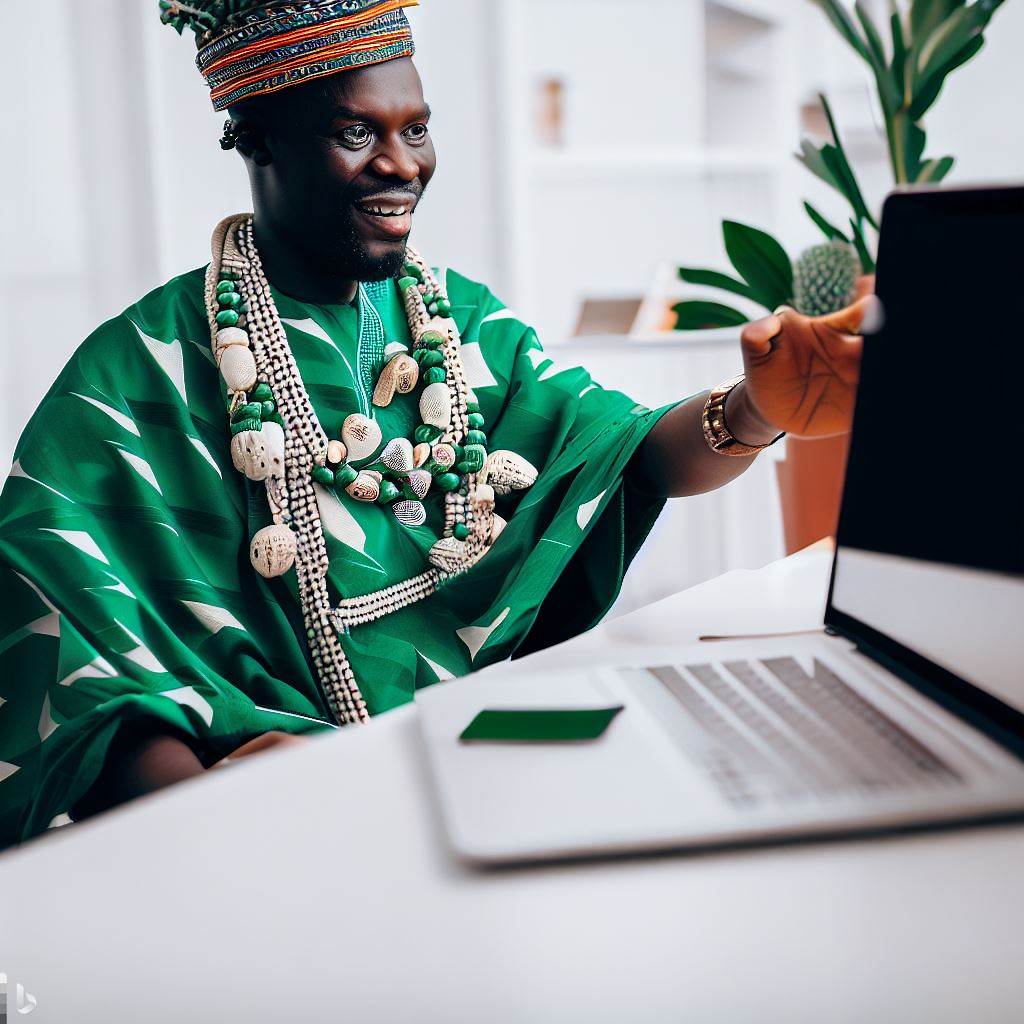Introduction
Nigerian culture is a vibrant and diverse tapestry of traditions, languages, and customs.
With a population of over 200 million people, Nigeria is the most populous country in Africa, and its rich cultural heritage has played a significant role in shaping various aspects of society, including web development trends.
In recent years, Nigeria has seen a rapid increase in internet usage and digital technologies.
As a result, web development has emerged as an essential industry in the country, with websites serving as the primary means for businesses and individuals to showcase their products, services, and ideas online.
The impact of Nigerian culture on web development trends is evident in various aspects of website design and functionality.
Nigerian culture emphasizes vibrant colors, intricate patterns, and storytelling, which are reflected in the visual appeal of many Nigerian websites.
Furthermore, Nigerian web developers often incorporate local languages, music, and art forms into their websites, creating a unique and authentic online experience that resonates with the country’s cultural heritage.
This blog post will explore the specific ways in which Nigerian culture has influenced web development trends in the country, examining the incorporation of traditional elements in website design and the use of technology to preserve and promote Nigerian cultural heritage in the digital age.
Overall, the impact of Nigerian culture on web development trends cannot be underestimated.
It has not only transformed the online landscape in Nigeria but also serves as a reminder of the powerful and enduring influence of cultural traditions in the realm of technology.
Overview of Nigerian Culture
Diverse Cultural Heritage of Nigeria
Nigeria’s cultural tapestry is a testament to its multi-ethnic composition.
Nigeria, a West African nation, boasts an intricate blend of over 250 ethnic groups, each nurturing distinct customs. This fusion of cultures shapes the essence of Nigerian heritage.
Language, Traditions, and Expressive Arts
Languages, traditions, and arts echo the heart of Nigerian identity.
Linguistic diversity thrives, with 500 languages spoken nationwide. Notably, Hausa, Yoruba, and Igbo stand as prominent tongues, harmonizing with others regionally.
Nigerian traditions intricately thread through society, uniting communities and safeguarding ethnicity.
Artistry flourishes vividly, spanning painting, sculpture, pottery, and textiles. Rich colors, intricate motifs, and cultural narratives convey historical events and societal themes.
Influence on Society and Digital Realm
Nigerian culture indelibly impacts societal norms and resonates in unexpected avenues.
Elders’ reverence, communal bonds, and extended families are the cultural pillars sculpting Nigerian society.
Globally, Nigerian culture radiates influence, pervading fashion, literature, cuisine, and even web development.
The digital sphere showcases a captivating interplay between heritage and innovation, giving birth to novel web development trends.
Impact of Nigerian Culture on Web Development Trends
The essence of Nigerian culture breathes life into contemporary web design.
Web development undergoes a vibrant transformation, mirroring Nigerian aesthetics.
Tribally inspired patterns, vivid palettes, and native languages infuse websites and apps, bridging familiarity for Nigerians worldwide.
In summation, Nigeria’s cultural mosaic, woven from diverse traditions, languages, and arts, is an influential force. Its resonance shapes societal norms and paves an artistic pathway into the digital age.
The global stage witnesses the captivating saga of Nigerian culture, enriching and inspiring far beyond its borders.
Read: Top 10 Successful Web Developers in Nigeria: A Journey
Web Development Trends in Nigeria
General Overview of Web Development Trends in Nigeria
Nigeria has experienced significant growth in the field of web development.
The country has witnessed an increase in the number of professional web developers.
Web development skills are in high demand, with businesses realizing the importance of an online presence.
Nigerian web developers are becoming more proficient in cutting-edge technologies and techniques.
The web development landscape in Nigeria is dynamic and constantly evolving.
Growth and Evolution of the Web Development Industry in Nigeria
The web development industry in Nigeria has evolved rapidly over the past decade.
Increased internet penetration and access to affordable smartphones have contributed to this growth.
Nigeria’s tech ecosystem has also played a crucial role in the development of the industry.
Local tech hubs and incubators have provided support and resources for aspiring web developers.
More Nigerian startups are focusing on building innovative web solutions and platforms.
Key Technologies and Frameworks in Nigerian Web Development
- HTML and CSS are the foundation of web development in Nigeria, with developers having a strong understanding of these languages.
- JavaScript is widely used for client-side interactivity and creating dynamic web pages.
- Frameworks like Laravel, Django, and Ruby on Rails are gaining popularity for web application development.
- Content Management Systems (CMS) such as WordPress and Joomla are widely used for website creation.
- Responsive web design is essential, considering the increasing use of mobile devices in Nigeria.
Overall, Nigerian web developers are embracing modern practices and technologies in line with global trends.
The industry continues to grow and innovate, with a focus on creating user-friendly and visually appealing web solutions.
Businesses in Nigeria are recognizing the importance of professional web development, leading to a higher demand for skilled developers in the country.
Read: Nigeria’s Growing Demand for Web Development Skills

Influence of Nigerian Culture on Web Development Trends
Nigerian culture holds a significant influence over web development trends in the country.
This influence can be observed in various aspects of web design and development, including the use of local languages, the impact of Nigerian traditions on aesthetics, and the role of Nigerian music and entertainment.
This section will delve into each of these aspects to highlight the distinctive impact of Nigerian culture on web development.
Explore the use of local languages in web development
Multilingual websites play a crucial role in Nigeria due to the country’s diverse linguistic landscape.
With over 500 ethnic groups, each with its unique language, it becomes essential to cater to the linguistic preferences of Nigerian internet users.
Incorporating local languages into website designs allows for better accessibility and engagement for a broader audience.
Web developers employ various techniques to incorporate local languages into website designs, including language selection options, translation features, and content localization.
By providing the option to switch between languages, websites can cater to users who may feel more comfortable navigating in their native language.
Additionally, translating website content and adapting it to local dialects enables users to access information in a language they understand best, fostering a more inclusive online experience.
Discuss the impact of Nigerian traditions on web design aesthetics
Traditional Nigerian art, patterns, and cultural symbols have a profound visual influence on web design aesthetics.
Web developers often draw inspiration from traditional motifs, incorporating them into website visual elements such as icons, graphics, and backgrounds.
This infusion of cultural aesthetics adds a unique touch to web design and creates a sense of familiarity and relevance for Nigerian users.
The use of cultural symbols further enhances the connection between websites and Nigerian culture.
Symbols representing traditional values, beliefs, and significant aspects of Nigerian heritage can communicate deeper meanings and evoke emotions in users.
By utilizing these symbols thoughtfully, web designers can create visually compelling websites that resonate with the Nigerian audience.
Examine the role of Nigerian music and entertainment in web development
Nigerian music and entertainment industry holds immense popularity and influence both domestically and internationally.
Web developers recognize this influence and leverage it to enhance user experience design.
Integration of music and videos on websites is a prevalent trend, allowing users to enjoy Nigerian music, movies, and other forms of entertainment directly on web platforms.
The Nigerian entertainment industry’s impact on web development goes beyond multimedia integration.
It also influences the overall design and aesthetics of websites by reflecting the vibrancy and energy associated with Nigerian music and entertainment.
This influence can be observed in the choice of colors, typography, and overall visual appeal of websites catering to Nigerian audiences.
In fact, Nigerian culture has a profound impact on web development trends.
From the use of local languages to the infusion of traditional aesthetics and the integration of music and entertainment, Nigerian culture shapes the web experience for users in the country.
Embracing and incorporating these cultural elements into web design not only enhances user engagement but also celebrates and promotes Nigeria’s rich cultural heritage.
Read: Salaries of Web Developers in Nigeria: A Thorough Insight
Delve into the Subject: The Growing Demand for Ethical Hackers in Nigeria’s Tech Industry
Examples of Web Development Trends influenced by Nigerian Culture
Websites Incorporating Nigerian Cultural Elements
- Jumia.com.ng: This popular Nigerian e-commerce platform showcases Nigerian fashion and traditional crafts, adding cultural elements to its web design.
- Nollywoodreinvented.com: This website dedicated to Nigerian cinema incorporates vibrant colors, African patterns, and traditional music, reflecting the country’s rich film industry.
- Dufuna.com: This online learning platform integrates Nigerian storytelling and folklore, using interactive animations and graphics to engage Nigerian users while promoting education.
Appeal of Websites to Nigerian Audiences and Celebration of Culture
These websites cater to Nigerian audiences and celebrate the country’s culture in the following ways:
- Language: Most Nigerian culture-influenced websites offer language options, allowing users to navigate in native languages like Yoruba, Igbo, or Hausa.
- Visual Representation: Vibrant colors, indigenous patterns, and traditional motifs used in website design appeal to Nigerian audiences by creating a sense of familiarity and pride.
- Cultural Content: Websites incorporating Nigerian cultural elements showcase indigenous products, arts, music, and films, promoting local talent and traditions.
- User Interaction: Websites often provide features that allow users to contribute content, share opinions, and engage with fellow Nigerians, fostering a sense of community.
Success and Impact of Websites in Local and Global Contexts
- Local Impact: Websites incorporating Nigerian cultural elements contribute to the promotion and preservation of Nigerian culture among the local population.
They serve as platforms for local businesses, artists, and filmmakers to showcase their products and talent, thus boosting the economy and fostering national pride. - Global Impact: Nigerian culture-influenced websites have gained international recognition and attracted a global audience.
They serve as a gateway for people worldwide to explore Nigerian culture, contributing to cultural exchange and tourism. - Economic Growth: By highlighting Nigerian products, fashion, and entertainment, these websites contribute to the growth of Nigeria’s creative industry.
They create employment opportunities, generate revenue, and position Nigeria as a cultural hub. - Education and Cultural Exchange: Websites like Dufuna.com, with their cultural storytelling and educational content, promote Nigerian heritage globally.
They enhance understanding and appreciation of Nigeria’s diverse culture among international users.
Overall, websites influenced by Nigerian culture contribute significantly to the development of web trends, appealing to Nigerian audiences while celebrating the country’s rich heritage.
Their success locally and globally showcases the impact and potential of Nigerian culture on web development.
Read: How to Start a Web Development Career in Nigeria
Conclusion
A summary of the main points discussed in the blog post reveals the significant impact of Nigerian culture on web development trends.
The rich and diverse cultural heritage of Nigeria has influenced various aspects of web development, including design, content, and user experience.
It is evident that Nigerian culture, with its vibrant colors, patterns, and storytelling traditions, has inspired web developers to create visually appealing and engaging websites.
Furthermore, Nigerian cultural values such as communalism and inclusivity have shaped the way websites are built and how users interact with them.
As technology continues to advance and the digital landscape evolves, it is crucial to delve deeper into the cultural influences in the tech industry.
This exploration will not only enable us to appreciate and celebrate the diversity of cultures but also inspire innovation and encourage the creation of user-centered web experiences.
Basically, the impact of Nigerian culture on web development trends cannot be ignored.
It is essential for web developers, designers, and industry professionals to recognize and embrace cultural influences, as they contribute to a more inclusive and dynamic digital world.




